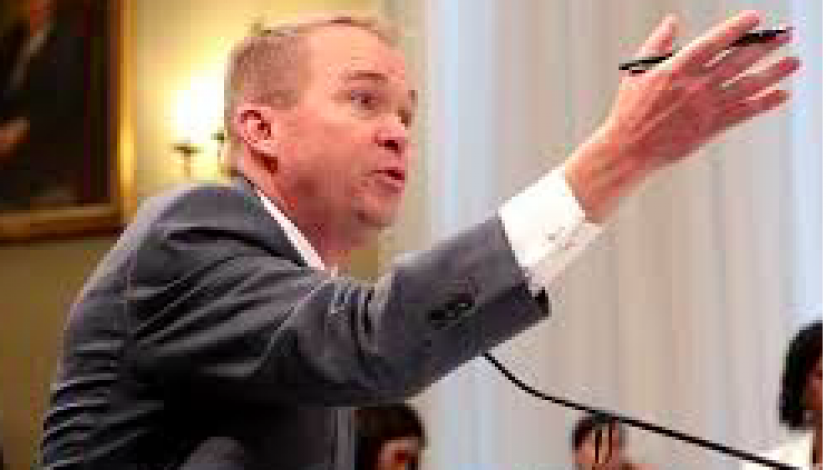Occupy CFPB: Mulvaney needs to rein in unruly agency
Armed with doughnuts and a favorable ruling from the Consumer Financial Protection Bureau’s counsel, Office of Management and Budget chief Mick Mulvaney occupied the still-warm office of Richard CordrayMonday and laid siege to Washington’s most controversial agency.
Defying his predecessor’s efforts to extend his reign of regulatory terror by appointing an interim successor, Mulvaney took charge, and later explained to the press corps why the agency that he now runs is indeed a sick, sad joke — as he had described it earlier.
Mulvaney voiced several reasons why Americans should back President Trump’s desire to rein in the CFPB. For example, if the CFPB harms you in any way, you have no redress whatsoever. You cannot complain to your senator or representative, since the CFPB does not answer to Congress.
You cannot ask the White House for help, because the president has no control over the agency. Presumably, you could sue, but the agency has been given such a broad mandate, it’s not clear that even the courts have much authority over the CFPB. That is frightening.
The CFPB director has total autonomy to levy fines on companies, determining the amount and the timing at his or her discretion, with no review baked into the process. That can lead to abuse. Indeed, it did just that when the agency charged auto dealers, whom they were explicitly barred from regulating under Dodd-Frank, hundreds of millions of dollars.
The companies were accused of racial discrimination, even though they were not allowed to collect racial data and never did so. The CFPB determined the extent of the mythical racist wrongdoing based on people’s surname.
The fines collected do not flow into the Treasury. Rather, they are accumulated into the Civil Penalty Fund, to be dispersed at the whim of the director. Aggrieved consumers may see some of that money, but only if the director says so.
Otherwise, it may be paid out to favored organizations involved with financial literacy or consumer education, for instance.
The CFPB has no restrictions against self-serving. Richard Cordray, widely expected to run for governor of Ohio, might have benefited from a rule he pushed outlawing mandatory arbitration clauses, which would have made it much easier for consumers to sue banks.
Many viewed the proposal as a gift to trial lawyers, a group that donates heavily to Democrat politicians and might well support Cordray’s future campaign. Trump and the GOP rolled back the rule.
There are many reasons why Congress needs to rewrite the law regarding how the CFPB operates, but many Republicans argue that its entire existence is unnecessary. After the financial crisis, Americans were rightly irate that our regulators missed the pile-up of “covenant-light” loans and shaky mortgage-backed securities that brought down our financial markets.
The authorities should have recognized the underlying vulnerability of financial houses to a collapse in the housing market. They should have seen the interconnectedness of financial institutions, a co-dependence that allowed the collapse of Lehman Brothers to cause the supposedly secure money market reserve fund to “break the buck” and ensuing failures to spread like a virus.
They did not. But that was not because we didn’t have enough oversight. Sen. Elizabeth Warren (D-Mass.) would have you believe that banks were unregulated, that Wall Street was behaving like a lawless Wild West, badly in need of a sheriff to walk through the saloon doors.
It isn’t true. There were hundreds of regulators ensconced in every bank in the country — permanently. There were seven different agencies overseeing banking activities and literally thousands of rules and regulations purporting to safeguard investor money.
JP Morgan Chase CEO Jamie Dimon once presented a chart that laid out the overlapping responsibilities of the seven existing regulatory bodies and the new ones created by Dodd-Frank; it looks like a spaghetti dinner.
What went wrong? It was “a failure of imagination,” as President George W. Bush once said about our inability to prevent the 9/11 attacks. Investors use models based on history and expectations about the future to determine how they should place their bets.
There was not a model in the land that even allowed for the possibility that real estate prices might go down nationwide, much less predicted it would happen, because it never had. The lucky few who bet on the mortgage collapse — like hedge fund manager John Paulson — made billions, because they thought outside the box.
That failure was not confined to private investors or Wall Street gurus; it also extended to the regulators in charge of those gurus. Would another layer of overseers have made any difference?
The obvious way to prevent another financial crisis and protect investors going forward is not through the CFPB, but rather through demanding greater capital cushions that would prevent failures and by reining in excessive risk-taking by firms that invest the public’s money.
New rules have required those changes, and the banking sector is considerably sounder than it was before the market collapse.
Justification for this skepticism lies in the CFPB’s failure to detect the massive years-long fraud being perpetrated at Wells Fargo in which retail bankers opened 3.5 million fictitious accounts in customers’ names, in order to meet sales goals. It was the Los Angeles Times that brought that scam to light, not Sen. Warren’s uber-sleuth regulator.
Wells Fargo also apparently cheated its business customers by charging fees higher than those agreed upon, in yet another quest for higher bonuses. Those activities are under investigation by the U.S. Attorney’s Office for the Northern District of California, the Federal Reserve and the Office of the Comptroller of the Currency, not the CFPB.
The point is not that the CFPB could not serve some useful purpose, but rather that like a weed in an overgrown garden, it has had to fight for sunlight. In so doing, it has abused its already abusive authority.
The Trump administration would like it plucked; at the least it needs to be severely trimmed back.

Published on The Hill




